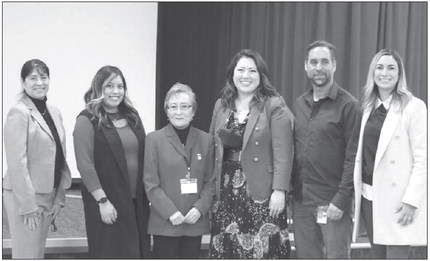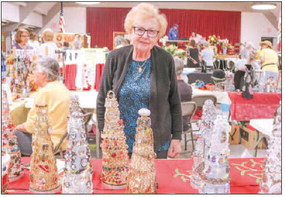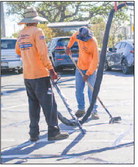New Year, New Connections brings awareness to the mental health of seniors


by Katya Lukina
LW staff
On Jan. 11, over 40 LW residents attended the New Year, New Connections event in Clubhouse 4, organized by the Council on Aging – Southern California ReConnect EISOA Program in partnership with the LWSB Member Resource Liaison Office. The goal was to address the older adults mental health, the new three-digit suicide prevention line 988, and connect people with the available resources.
The President of the Golden Age Foundation, Anna Derby, introduced the event by providing the history on the Council on Aging protective services for veterans and older adults and its collaboration with the Golden Age Foundation.
Michelle Jo Park, MD, program psychiatrist for the Council on Aging – Southern California ReConnect Program, made a comprehensive presentation on elder abuse. According to the National Center on Elder Abuse, the number of older adults in the U.S. has been growing and is projected to outnumber children by reaching 70% of the population by 2060.
This growing population faces a number of challenges. One is ageism, or discrimination based on age that can include mental or physical abuse.
Older adults also face health issues. According to Park, 80% of older adults have at least one chronic health condition, and 50% have two or more. Approximately 40% of them report some type of functional disability, including age-related changes in metabolism of medications and alcohol, in particular.
One in four adults will continue to use prescribed anxiety, pain or insomnia drugs long term, which may cause lethargy, confusion, falls and other life-threatening risks. Drug and alcohol use among older adults is particularly dangerous, Park explained, since they are more susceptible to the harmful effects of these substances.
In addition to physical health issues, mental health disorders are a common issue among older adults. People can suffer from the whole spectrum of disorders, including depression, dementia or neurocognitive disorders, anxiety and substance abuse.
One in four older adults experience loneliness and social isolation that may negatively affect mental health, leading to depression, heart disease and more. Park explained that older adults, victims of elder abuse, immigrants, minorities and members of the LGBTQ community are at a higher risk of experiencing loneliness.
Statistics show that 19.9% of adults 65 and over die by suicide, Park said. White males ages 85 and over have the highest rate of suicide in the U.S.
According to Park, COVID-19 had less impact on older adults’ mental health than expected. COVID deaths, however, occurred in large numbers in people 75 and over, causing a loss of population. Unvaccinated and unboosted older adults made up the majority of deaths, and only 51% of older adults have received their booster shots.
Besides mental and physical health challenges, older adults can also face elder abuse, which includes physical, psychological, financial and sexual abuse, as well as neglect, Park explained. One in ten older adults suffer from abuse, and signs of abuse require immediate action.
Over the past five years, the number of Americans providing unpaid care to an adult with health or functional needs has increased from 43.5 to 53 million. The negative mental and physical impact of caregiving on family members has also risen.
According to statistics cited by Park, the U-shaped curve of happiness in the U.S. is one of the lowest in the world. However, people aged 64 and older are still the happiest compared to other age groups.
Despite these challenges, studies show that older adults are resilient, and that resilience can be taught and learned. Many people become more resilient after suffering a traumatic event, Park explained, and reap the benefits of it by slowing aging and better recovering from future diseases. Positive and secure attachments, reducing stress, the establishment of social networks and physical activities are just a few ways people can promote resilience to trauma.
After Park’s presentation, people learned more about the National Suicide Prevention Lifeline (988) from Joanna Constanza, training and outreach coordinator, Survivor Support Services at Didi Hirsch Mental Health Services.
Though the 1-800985-5990 number still works, the new three-digit 988 number speeds up the connection and routes the caller to the national Lifeline. The Lifeline is different from dialing 911 in that it stabilizes most situations over the phone and connecting a person with local resources to help.
The long-term goal of 988 Lifeline is to help people be more open about mental health and recognize when someone is at risk. This three-digit number can be used by an individual in crisis or by a third party such as a friend, parent, or a teacher.
Dr. Kevin Alexander, Service Chief of Orange County Health Care Agency, spoke of the county’s resources that are available to those in crisis, with a goal to reduce suicide rates and bring community together.
He added that the OC Links at www.ochealthinfo.com/services- programs/mental-healthcrisis- recovery/navigation-helpresources can offer help immediately, which has improved in the last ten years along with private and public insurance requirements.
According to Alexander, the county works closely with the Department of Education and non-profits to educate young people about available resources and to destigmatize conversations about mental health. He added that people need to ask questions if someone seems suicidal and assure them that everything will be okay. Derby thanked the participants and attendees for their time and reminded the residents to reach out to GAF or Members Resources Liaison Robann Arhsat, with questions or resources for financial and emotional issues. Nick Massetti, the GRF Board member and the facilitator for the Depression and Bipolar Support Alliance said he enjoyed the event and encourages people to be more open about mental issues.
He invited anyone diagnosed with bipolar disorder, depression, or anxiety to attend the free classes (East Long Beach support group) via Google meet on Wednesday evenings.
For time and more information, email: dbsaeastlb@gmail. com.

Guest speaker Joanna Constanza shared her personal experience with losing a loved one to suicide and how to recognize when someone is at risk and where to seek help.

Many LW residents found the event topics valuable and informative.




